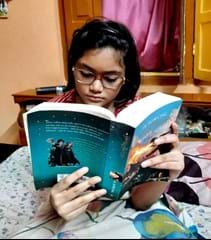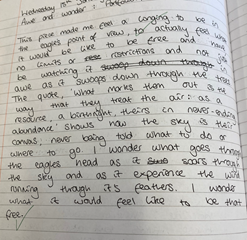I was full of hope when Amanda Spielman began talking over a year ago about the need for a renewed focus on curriculum as part of school inspections. Ofsted’s significant influence being brought to bear on such concerns seemed a really sensible way to give schools permission to move away from an excessive focus on assessment caused by various accountability measures.
Having watched all two and a half hours of a recent Ofsted curriculum workshop available on Youtube (one of four viewers so far to make it to part seven, though I’ve no way of knowing if they watched the other six!), I’m still not without hope. However, I am alarmed at some of the ways in which English is presented and, contingently, what seems to be an excessive focus on vocabulary. This is important not just for English as a subject but also for the presentation of broader issues around cross-curricular literacy - reading, writing and speaking and listening in all subjects.
First, the reasons for optimism. The presenters are at pains throughout to stress that Ofsted do not favour one model of curriculum over another. They also stress that they want individual schools to think carefully about the particular curriculum that would work best for their pupils. Says one speaker, “Ofsted do not have a specific view on these areas [the content of History and Literature lessons] but we would expect real thought and care in terms of what is chosen.” The ideas expressed have clearly been influenced by a small number of educational theorists and researchers mainly working in cognitive science and psychology (with some commentators, perhaps rightly, finding this particularly worrying); however, if one is being optimistic, there are strong messages about the importance of all learning being grounded in context, that may also signal a recognition that different subjects have different kinds of issues around the nature of the knowledge base and ways of teaching it.
While there is rather a lot of comment about how curriculum is the ‘what’ of learning rather than the ‘how’, there are still a number of sensible comments that would actually seem to belie this unnecessary division. For example, one presenter says,
When we think about memory, it’s not just a repository for facts, it’s the place where we’ve worked through problems, we’ve thought about the problems that we’ve looked at, we maybe stored in there [our memory bank] what’s occurred, teased out key ideas to understand them for ourselves; it’s the place where our conclusions that we’ve drawn from that sit. And we draw on these things as we move through the curriculum.
If ever there were a case for the ‘how’ alongside the ‘what’ this would seem to be it. It's good to see this.
The same speaker has what seems to me to be rather sensible words about a possible approach to history:
If I’m thinking about interpretation then in Year 7 we might be looking at an individual – was King John a bad king? – that kind of inquiry question. As we move on we might consider interpretation in the way that Tudor portraiture is used. We might consider Empire as pupils move through the school and the changing nature of Empire, how it’s been viewed by different historians over time and then into GCSE and A Level we might get on to historiography and the changing views of historian.
His very next comment, though, exemplifies my concerns. Turning his attention to English, he says,
If we take reading, for example, you’ve got your knowledge of vocabulary, your know what, which allows reading comprehension, your know how.
He then asks his audience to read a passage by Robert MacFarlane, asking what GCSE-age pupils would need to know in order to tackle it. The following slide summarises his suggested ideas.

I think that the example is offered to show the different learning that needs to occur across the curriculum at some stage in a pupil's life rather than just in English if they are to understand writing like this. However, this isn’t made clear. Consequently, this and the other example drawn from English, in which members of the audience are asked to list what pupils would need to know in order to evaluate a descriptive passage by Dickens about London, reinforce some of the current deep misunderstandings about our subject and, ironically, offer a model that is entirely predicated on a curriculum based on learning how to respond to examination questions. It risks turning English classrooms into places where teachers feel obligated to load pupils with the history of almost everything before they can begin to read a text themselves. It also fails to engage in any way, shape or form with the accepted academic disciplinary practices of English, turns literary study into little more than language-based comprehension and practically ignores real language study. Far from looking 'knowledge-rich', it gives an impression of a rather impoverished, limited idea of what knowledge looks like in English. Ofsted might argue that there was no space to engage specifically with the broader concepts of English as a discipline at this initial stage, but it needs to recognise the damage that could be done by privileging a handful of exam-led types of English lesson and presenting them in the context of a new kind of curriculum focus. Surely it needs to be making it absolutely clear that these are not, in the general round and away from practising in the immediate run-up to assessment, what it wants to be seeing in English classrooms?
References to “knowledge about vocabulary” are threaded throughout the presentation as the key knowledge in English and are, perhaps, the main point of concern. My colleague Barbara Bleiman has written about this extensively on our blog and in the TES, but it does bear repetition. Despite saying that the presentation is grounded in “warranted research”, “accepted research, “not research from a small research project”, the presenters return repeatedly to highly contested research by Hart and Risley (1995) with its headline figure of a ’30 million word gap’. This research claims that over four years a young child from a middle-class household on average is exposed to 45 million words, in a working-class household 26 million and in a household receiving welfare 13 million. The most significant metaresearch on reading, such as that by Castles, Nation and Rastle, moves well beyond this outdated and unhelpful study, and does so for good reason.
Real problems are already emerging based on the leap of faith which uses the Hart and Risley research to justify foregrounding explicit vocabulary teaching in almost every part of the curriculum, without giving teachers a thorough grounding in how, exactly, vocabulary development occurs. We certainly want language-rich classrooms in which pupils hear and use a wide vocabulary as and when desirable, but we also need to be alert to the limitations of explicit teaching of vocabulary. Increasingly we’re seeing lessons where pupils are presented with quite long lists of words, often decontextualised, which they are expected to use in the lesson, even if they aren’t appropriate. Substantial amounts of classroom time and attention are being devoted to teaching words in ways that aren't even effective. This isn’t what the Ofsted presentation intends to happen, I’m sure. But if it is already going on simply because there is a lot of talk about vocabulary in the ether, then imagine what will happen when teachers have to rapidly respond to officially sanctioned information with no time for training or even adequate reflection.
Huge claims are made in the presentation for the place of vocabulary in the curriculum. Yet Bringing Words to Life, one of the most authoritative and oft-quoted texts on vocabulary development, itself makes relatively measured claims. It is written by people actively involved in research in the field, which perhaps explains the careful qualifications that are threaded throughout. Yes, it says, vocabulary instruction is important, yes it can be direct instruction sometimes (though contextualised approaches are best); but, it also explains, pupils can only learn a very limited number of new words in any given period of time and vocabulary learning must not take excessive time from the rest of the curriculum. A summary of some of the research discussed in the Bringing Words to Life appears in a slide we’ve been using at EMC for several years.

My hope is that Ofsted will clarify why the examples from English were so poorly chosen, and recognise the danger of using examples like this so early in their presentation, even if (fingers-crossed) they are not representative of what they would see as a good English curriculum. To do this, they need to explicitly say that the slides are not representative (quite the opposite, in fact) and they need to provide strong, concrete examples that have been properly commented on by a range of stakeholders. If not, then we risk seeing new Ofsted myths arise: ones which dictate every single lesson must include explicit teaching of vocabulary, and that reading of all texts must start with teaching content and context before they can be understood.
The words about a history curriculum quoted above got me thinking about how English might draw on similar structures. Perhaps we could think about what teaching novels might look like over a five-year period. If I was back in my old London school, for example, I might start by teaching Alex Wheatle’s Crongton Knights to Year 7, focusing on personal response to its portrayal of life in the inner city. I might compare it to parts of Great Expectations, with its similar concerns about London, young people and crime, with a focus on how literary language is used differently in different times. I might layer in more critical reading in Year 8, perhaps with a focus on narrative voice and characterisation in Sonya Hartnett’s Thursday’s Child. I might read an Isabel Allende short story alongside this in order to focus on form as well, specifically the use of magical realism. In Year 9 I might begin looking with more focus at written critical responses, introducing some 19th century literature (probably Dickens, again, with A Christmas Carol), but with lots of contemporary short stories alongside this as alternative ways to think about the broad range of concepts explored in literary study. Finally, in GCSE, I would distil all of this work into teaching two examination texts, adding in ideas about the different critical positions it is possible to hold about the same text. Let’s give Dickens a pass this time and go for Jane Eyre!
I’ve written this blog quickly, with the Christmas holiday fast approaching. Ofsted are intending to put their work out to consultation before they publish their new framework and I would urge English teachers to have their say. There are other concerns that in a genuinely democratic process should be discussed fully, including the terms of the consultation itself. For example, will it be a genuine consultation with any number of final outcomes possible? Or are teachers being asked to comment on what has already been written, with opportunities only for minor tweaking (a ‘confirmatory consultation’ to use the doublespeak of other recent government-sponsored education initiatives)? Alongside this, some other questions worth asking might be:
- who exactly was on the Ofsted advisory curriculum board and how were they selected?
- how were the schools selected for the Ofsted study about curriculum?
- why hasn’t the information about the previous two questions been transparently communicated already (and apologies if it has)?
- why is there such a focus on a deficit model of knowledge and no mention of building on the rich knowledge that pupils from all backgrounds bring to the classroom?
- why does the workshop include no discussion of different disciplinary models of curriculum, including ones that stress the importance of the ‘how’ as well as the ‘what’?
- where did the English subject expertise come from in putting together the workshop presentation?




